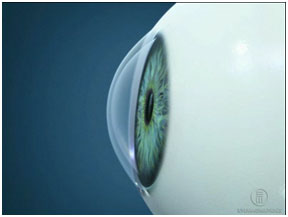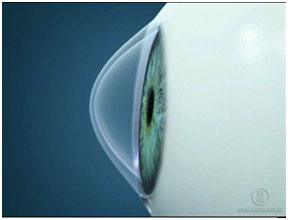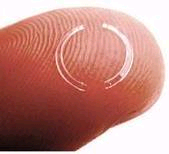
Keratoconus is a disease that creates a thinning of the cornea. Normal outward pressure within the eye causes the cornea to progressively bulge into a cone-like shape. The change in the cornea’s shape can have a dramatic impact on one’s vision. In more severe cases, normal everyday activities such as driving and reading can be difficult to perform.
There is evidence that the disease has genetic origins possibly made worse by environmental factors. It normally affects both eyes although it typically progresses at different rates. In most people keratoconus begins during their teen years and slowly worsens before stabilizing in their 30s or 40s.
As the cornea becomes more irregular in shape, it causes progressive nearsightedness and irregular astigmatism to develop, creating additional problems with distorted and blurred vision. Glare and light sensitivity also may occur.



With mild keratoconus, eyeglasses or contact lenses may help. But as the disease progresses and the cornea thins and becomes increasingly more irregular in shape, glasses and regular soft contact lens designs no longer provide adequate vision correction.
For keratoconus patients who are contact lens intolerant, there is now a revolutionary new procedure available, Intacs.

Intacs are clear, thin plastic corneal implants placed in the periphery of the cornea
Before Intacs became available, corneal transplants were the only treatment option for those who could not tolerate contact lenses or obtain functional vision with contact lenses or eyeglasses. Not only are Intacs much less invasive than corneal transplantation, the procedure only takes a matter of minutes and is done as on an outpatient basis. The implantation of these inserts flattens the cornea in keratoconus patients to improve vision and increase contact lens tolerance.
The goal of the Intacs procedure is to provide the keratoconic patient with the ability to achieve improved functional vision with contact lenses or glasses and in some cases without them.
If you suffer from impaired vision due to keratoconus call A Center for VisionCare to schedule a consultation. Dr. Mario Meallet specializes in the Intacs procedure and can help to determine if you are a candidate for this new and exciting option for treating keratoconus.